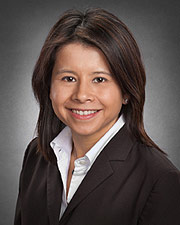Amber Luong, MD, PhD, Awarded CCTS Grant in Support of Continued Chronic Rhinosinusitis Investigations
An immune-mediated inflammatory disease involving the paranasal sinuses, chronic rhinosinusitis (CRS) affects more than 10 percent of the population and is the second most common chronic disease in the United States. Despite its high incidence, the pathogenesis of CRS remains poorly understood, and no curative treatment exists.

Amber Luong, MD, PhD
“Recent studies by our lab revealed a close association of type 2 innate lymphoid cells (ILC2) and mast cells in CRS patients,” says Amber U. Luong, MD, PhD, who is co-principal investigator with Yeonseok Chung, Ph.D., of a new research project entitled Interplay Between Mast Cell and Type 2 Innate Lymphoid Cells in Chronic Rhinosinusitis, funded by a $50,000 Center for Clinical and Translational Science (CCTS) Pilot Project Award. “In addition, our unpublished study demonstrates that mast cells are required for the generation of ILC2 in an animal model of allergic asthma. This new grant is allowing us to investigate the role of mast cells in the generation and function of ILC2 as a main pathogenesis of CRS in humans, a relationship that remains unexplored.” The study will be supplemented by Dr. Chung’s work investigating the role of ILCs on mast cells using a mouse model.
Dr. Luong is an associate professor and director of research in the department of Otorhinolaryngology—Head and Neck Surgery at UTHealth Medical School, and directs a laboratory at the Brown Foundation Institute of Molecular Medicine for the Prevention of Human Diseases at UTHealth Medical School.
“Some relatively newly described data suggests that innate lymphoid cells may play a more extensive role in initiating and propagating the immunological response characteristic of chronic rhinosinusitis with nasal polyps (CRSwNP),” she says. “Innate lymphoid cells are clearly the first responders, as we showed in a publication in August 2013.[1] There is some evidence in the literature that they play a more central role in the initiation and propagation of T helper 2 (Th2) response by coordinating both the adaptive and innate immune response. In this new study we’ll determine the relationship between ILC2 and mast cells and Th2 lymphocytes isolated from CRS patients ex vivo and determine the mechanism of mast cell regulation of ILC2 and Th2 during airway inflammation in vivo with a mouse model of allergic airway disease.”
The goal of the Center for Clinical and Translational Sciences is to facilitate clinical and translational research at The University of Texas Health Science Center at Houston, The University of Texas M. D. Anderson Cancer Center and the Memorial Hermann Health System. The CCTS is one of the original 12 centers funded by the National Institutes of Health’s Clinical and Translational Science Awards, which are designed to strengthen and support the entire spectrum of translational research from scientific discovery to improved patient care.